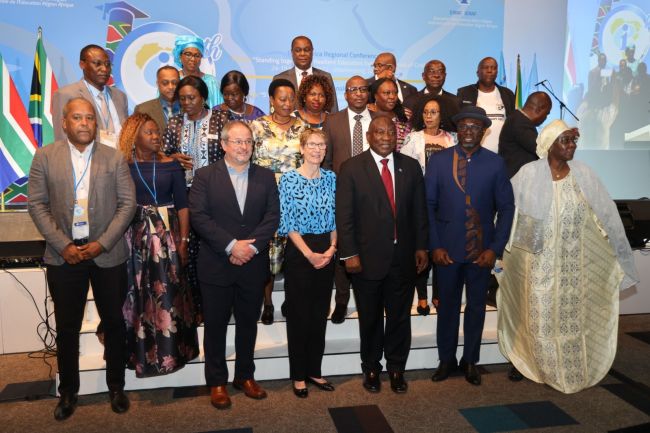Education Leaders Gather at EI Africa 10th Regional Conference to Prioritize Inclusive and Resilient Education Systems.
Teachers and education union leaders across the African continent have converged at the Sandton Convention Centre, Johannesburg, South Africa, for the 10th Education International Africa Regional Conference, to discuss the pressing need for inclusive and resilient education systems. The conference is held under the theme "Standing together for resilient education systems in times of crisis". The conference was officially opened by His Excellency, Matamela Cyril Ramaphosa, President of the Republic of South Africa.
President Ramaphosa emphasized the importance of education for all during his opening remarks. He firmly asserted that education should be decolonized and enriched with the rich cultural heritage of Africa. The President highlighted the impact of the COVID-19 pandemic, which accelerated digital transformation globally but also exposed the deepening digital divide. He expressed concern for disadvantaged learners, particularly those in rural communities and students with disabilities, who faced significant challenges during the transition to online learning.
"I am rather glad that deliberations are going to be rooted in how we can make our education systems resilient to withstand these crises," stated President Ramaphosa. "Whether they arise from climate change, conflicts, or natural disasters such as fires and floods, these disruptions affect people's lives. I hope that your deliberations will generate strategies and actions that enable our nations, especially in Africa, to navigate through these challenges successfully,” he stressed.
Echoing President Ramaphosa's sentiments, Education International's President, Susan Hopgood, emphasized the importance of dialogue, reflection, and learning from one another. She recognized that the issues faced by education systems may seem local, but they have regional and global implications. Insufficient investment in education, growing privatization, disregard for teachers' rights, the increasing casualization of the profession, concerns about pay, pension, and social security, as well as existential threats to civil society, the public sector, democracy, and the environment due to climate change, were mentioned as common challenges faced worldwide.
"There is only one way to make inclusive quality education a universal human right and priority," asserted President Hopgood. "That way is to 'Stand Together,' mobilize our unions and communities, engage our governments, and hold them accountable for funding the future through quality public education. Inclusive education is the cornerstone through which countries develop, and it is our duty to ensure that no learner is left behind."
The conference aims to foster collaboration among education stakeholders and develop actionable strategies to address the identified challenges. Participants will engage in intensive discussions, sharing best practices, and exploring innovative approaches to transform education across Africa. By harnessing the collective wisdom and expertise present at the conference, education union leaders hope to pave the way for resilient education systems that can weather various crises and empower learners across the continent.
As the 10th Education International Africa Regional Conference progresses, the focus remains on charting a path toward inclusive, equitable, and sustainable education systems. With leaders and experts at the forefront, it is anticipated that the outcomes of this conference will shape the future of education in Africa and promote educational opportunities for all, irrespective of their backgrounds or circumstances.

[Tue, 21 Nov 2023 15:34:00 +0000] | DIGG THIS
Education International · No. 3 Torshie Close, · Mempeasem · East Legon Extension · Accra · Ghana
Phone: +233.302.50.12.00 · Fax: +233.302.50.66.81 · Email: eirafoffice@ei-ie.org
Website Development and Design by Cyblance
